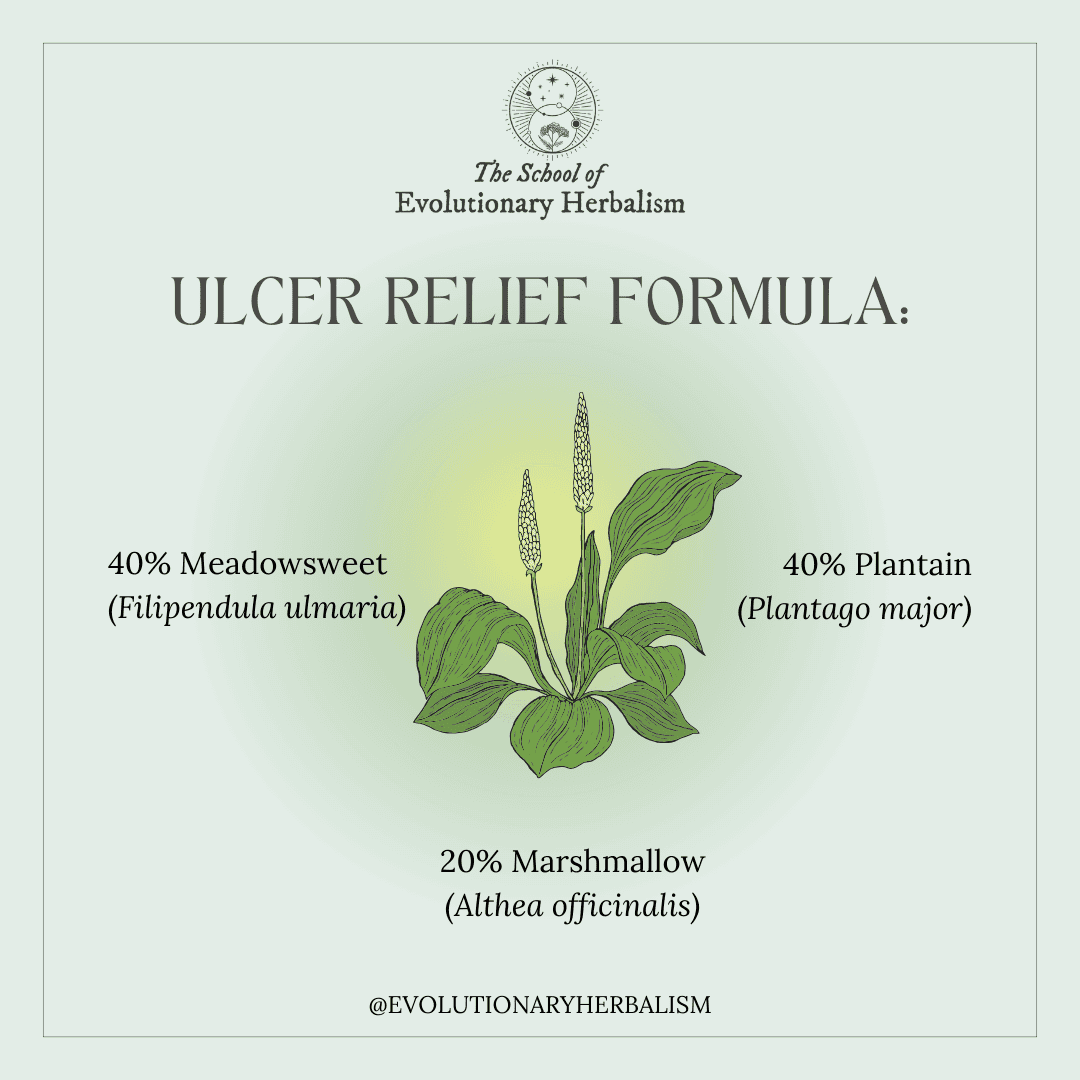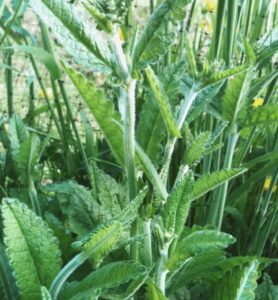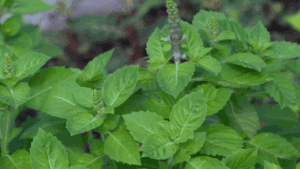Meadowsweet is often thought of as herbal aspirin. Even though it’s no secret that its compounds were originally used to formulate and synthesize aspirin, can you really use it in the same way?
If you want to get the same results from Meadowsweet as aspirin, you would have to drink quarts of the tea, which is tough to do because it’s incredibly bitter. Not only would you be feeling pretty nauseous by the end, but you would also only get the strength of a baby aspirin, if you’re lucky!
Even though Meadowsweet contains aspirin-like compounds, they are not the same. Meadowsweet is an herb used for centuries, and although it has many traditional uses, its applications are more relevant than ever in our modern day.
In today’s plant profile, you’ll discover:
- Meadowsweet’s bitter and astringent taste and why this combination is so good for treating ulcers
- How Meadowsweet alleviates heartburn, ulcers in the GI, joint pain, and more with its energetic and biochemical properties
- Why Meadowsweet is helpful for so many modern-day issues that didn’t use to exist
- Meadowsweet’s powerful connection with Saturn and how it balances other planetary influences
Table of Contents
Have you ever wondered if a single component could define the healing power of an entire herb? While it’s tempting to think so, the reality is far too complex to be true.
When an herb contains a biologically active constituent, it can offer significant insights into its medicinal properties, yet this is only one piece of the puzzle. This is especially true for plants rich in salicylates, compounds that form the basis of modern aspirin. However, to view these herbs merely as “natural aspirin” is to miss out on their holistic nature and medicinal virtues.
Today, we’ll look at Meadowsweet and explore some interesting dynamics of this herb, including how it can actually treat the same pattern of imbalance that excessive use of NSAID’s (Non-Steroidal Anti-Inflammatory Drugs) can cause.
Meadowsweet was previously listed under the Latin genus Spiraea, but botanists reclassified it to Filipendula. Spiraea plants were the first to have salicylates isolated from them, which eventually became the base for salicylic acid and aspirin. Interestingly enough, the name aspirin originates from Spiraea (a-spirea).
This herb is very rich in salicylates, which contributes to many of its medicinal applications. Because of their salicylate content, some people think these herbs can be used as a natural form of aspirin. However, even though Meadowsweet and aspirin share overlapping compounds, they are not the same thing. Pigeonholing Meadowsweet as a natural aspirin will not only stop you from getting the results you want, but also isn’t a holistic view of the herb.
Herbalist Paul Bergner said that to get a comparable dose of aspirin using Meadowsweet, Willow, or other salicylate containing herbs, you would need to decoct ounces of the herb, make an extremely concentrated decoction, drink tons of it, and you would still would only get the equivalent of maybe a baby aspirin.
By understanding Meadowsweet’s unique dynamics, you can get beyond the allopathic approach to this powerful herb and start seeing it for the underlying patterns of imbalance it treats.
Common name: Meadowsweet
Latin name: Filipendula ulmaria
Family: Rosaceae
Part Used: Aerial parts
Tastes: Bitter, Astringent
Affinities: Digestive System (notably the upper GI), Urinary Tract, Musculoskeletal System (especially the joints)
Actions: Bitter Tonic, Alterative, Astringent
Energetics: Cooling, Drying, Tonic

Taste
Predominantly bitter and astringent, these are the two tastes common with salicylate-containing herbs, such as Willow (Salix spp.). If you ever crunched down on an aspirin, you know the taste is really unpleasant—bitter and astringent. As you will come to see, these two tastes highlight most, if not all, of Meadowsweet’s medicinal virtues.
Affinities
Meadowsweet is a major digestive remedy, with old doctors considering it one of the best digestive medicines available. It works for specific patterns in the digestive system and is most effective for the upper GI and stomach where it is most widely applied. That said, it will have influences lower down in the tract as well.
In addition to its digestive benefits, Meadowsweet is a urinary tract remedy that works on the bladder, ureters, and urethra. Lastly, Meadowsweet has a strong affinity for the musculoskeletal system and the joints specifically.
Actions
Meadowsweet isn’t an herb that can be used in a hundred different ways like Yarrow (Achillea millefolium). It’s more of a specialist, providing very precise actions for specific indications.
Its bitter taste gives Meadowsweet bitter tonic properties, stimulating the digestive system, liver, and gallbladder. Even though Meadowsweet is not generally classified as a liver/gallbladder remedy or a cholagogue or choleretic, its bitterness supports and stimulates digestion to a degree.
The main secondary action of its bitter tonic properties is that it’s an alterative. Here it is rather specific to cleansing excess uric acid from the body. This makes it beneficial for gouty arthritis and arthritic pain due to excess uric acid accumulation in the joints. Meadowsweet’s alterative affect predominantly works on the kidneys and bladder, leading to a diuretic effect.
The primary action where Meadowsweet shines is as an astringent that tightens, binds, and contracts tissues that are overly lax and loose. Astringent plants are drying, which you can feel by how they make your tongue dry and mouth pucker. This may not be the most pleasant sensation, but it’s exactly what organs with a relaxed tissue state need since they passively leak fluid out of the tissue.
By astringing the tissues, you strengthen the Earth Element and help the body retain fluids. In traditional Chinese medicine, the astringent taste is said to restrain and hold in the yin, keeping fluids where they belong.
Meadowsweet’s primary action is its astringency, which helps tonify the digestive system by astringing the gastric mucosa of the upper GI tract. This pairs with its bitter properties to drain metabolic waste products and fluids, supporting the digestive system.
Because of its combination of actions, Meadowsweet is one of the best remedies available for treating gastric ulcers. Ulcers produce a lot of heat, inflammation, irritation, and pain, and are often accompanied by infection by H. pylori. Meadowsweet provides pain relief via the salicylate compounds, while the astringents contract and tighten the wounded tissue. The bitterness helps to cool excess heat, inflammation and irritation, and it also inhibits H. pylori. In a way, it’s like a formula unto itself.
If you picture a bleeding cut on your arm and how an astringent stops the bleeding and heals the wound, the same thing happens internally on the mucosa (internal skin) of the digestive system. Because it’s so astringent, Meadowsweet is one of the top herbs to consider for ulceration in the GI. For this pattern, it combines well with Yarrow (Achillea millefolium), Plantain (Plantago major), Gotu Kola (Centella asiatica), Marshmallow root (Althaea officinalis), and Licorice (Glycyrrhiza glabra).
Some texts classify Meadowsweet as an antacid, which aligns with its uses for excess heat and irritation in the GI and stomach. With these actions, it is one of our primary herbs for heartburn, burning and sour belching, and other symptoms of too much heat in the upper GI rising.
With its cooling, draining, and downward-bearing action, Meadowsweet sedates excess heat and irritation. When this pattern occurs in the lower GI, Meadowsweet is a choice remedy for excessive intestinal permeability, such as leaky gut. With this condition, people have an inflamed gut often accompanied by food intolerances.
Meadowsweet cools down that heat as an inflammation-modulating plant, lowers irritation, and its bitterness supports general digestion. The astringency also tightens and binds up the excessive permeability of the gaps in the gut wall. All together, Meadowsweet is extremely supportive in leaky gut protocols and pairs well with Calendula (Calendula officinalis), Plantain (Plantago major), Marshmallow root (Althaea officinalis), Turmeric (Curcuma longa), Licorice (Glycyrrhiza glabra), and Agrimony (Agrimonia eupatoria). As an astringent, it can be useful in the treatment of diarrhea, often combined with carminatives and other mild astringents.
These similar actions apply in the urinary tract, where it restrains fluid secretion. This makes it helpful for dribbling urine, urinary incontinence, and other patterns where an astringent is needed in the urinary tract. Considering its cooling impact on hot, irritable, and burning pain, Meadowsweet is beneficial for a urinary tract infection as well.
Meadowsweet is cooling because it sedates heat. Herbalist Thomas Avery Garran categorizes Meadowsweet as an herb that drains fire in his book, “Western Herbs in Chinese Medicine.” In Chinese medicine, you have heat and fire, with fire being an extreme form of heat. Meadowsweet is good for heat patterns and inflammatory-based pain. This makes it beneficial for the joints, arthritic pain, rheumatic pain, uric acid deposits, and joint pain due to liver stagnation because of the bitterness that clears liver heat and has aspirin-like compounds known for inflammation-based pain. As you can see, the best way to think about the plant is not just biochemically, but also by considering the energetics to determine how to apply it.

Energetics
Energetically, Meadowsweet is cooling, drying, and astringent. It is cooling because of its bitterness, which sedates heat. It has a drying influence on the tissues because bitter-tasting herbs drain fluids, and also because Meadowsweet contains tannins, which dry local fluids.
Even though Meadowsweet is so bitter, draining, and drying (locally), herbalist Thomas Garan says it helps you restrain your yin and hold in fluids better. In other words, Meadowsweet can help your body retain its hydration in the long run even if it has a local drying effect.
Because Meadowsweet is cooling and drying, it’s great for the heat/excitation and damp/relaxation tissue states. When heat and dampness combine, you get damp-heat patterns, which can be noted by redness, heat, irritation, swelling, puffiness, and fluid retention. Meadowsweet is phenomenal at balancing conditions with this underlying dynamic.
According to Ayurveda, Meadowsweet reduces pitta because it’s so cooling and kapha because it is drying. However, because it is cold, drying, and astringent it can easily aggravate vata. By understanding the energetics of Meadowsweet, you can be sure to use it for the right tissue states and constitutions and formulate it with others to moisten and warm it when needed.
Specific Indications
Meadowsweet has several specific indications where it shines. This herb is indicated for ulceration in the GI tract and excess heat in the GI, particularly for heartburn. It also works excellently for intestinal permeability and leaky gut syndrome due to its astringency. In the urinary system, it is used for urinary incontinence and urinary tract infections, and in the musculoskeletal system it relieves arthritic and inflammation-based pain.
Personality-wise, I think of Meadowsweet for people who are fiery, drink too much coffee or alcohol, and experience a hot, burning pain that radiates up and out from the upper GI.

Alchemical Correspondences
Meadowsweet is a great example of a Saturnian plant. From the perspective of medical astrology, Saturn governs the joints and the structural components of the body, including the bones, teeth, connective tissues, and the joints themselves. Saturn is the coldest and driest of the planets and tends to contract and constrict things. This description fits Meadowsweet perfectly.
Saturn is said to generate many chronic degenerative diseases but also treats a wide variety of problems stemming from other planetary imbalances. The coldness of Saturn treats the heat of the Sun and Mars, its astringency tightens the laxity of Venus, and it dries the dampness of the Moon. Saturn also balances patterns of excess heat and dampness generated by Jupiter (a planet classically associated with gout).
This herb brings a Saturnian influence into the digestive system to cool, dry, and tonify it. It does the same thing in the urinary tract and joints. Meadowsweet’s primary organ affinity is the musculoskeletal system and joints, which is another planetary correspondence to Saturn.
Elementally, Meadowsweet is a Fire element plant. Thomas Avery Garran mentions that it is used for excess fire in traditional Chinese medicine, and it even looks like a fiery plant. With its sharp, serrated leaf margins and bright red color along those margins, Meadowsweet has a signature for heat in the edges of tissues, such as in the linings of the stomach, GI, bladder, urinary tract, and ureters. In all of these linings, Saturn cools down the heat and irritation.
While Meadowsweet is sometimes labeled as the herbal aspirin, this potent plant has a rich history of use spanning centuries. It’s especially effective for addressing patterns of heat, irritation, and pain. By recognizing Meadowsweet’s unique qualities and specialties, you can harness its power to target specific imbalances and achieve effective results—learning to see beyond its reputation as an herbal aspirin and into its medicinal virtues as a whole.

Ulcer Relief Formula
40% Meadowsweet (Filipendula ulmaria)
40% Plantain (Plantago major)
20% Marshmallow (Althea officinalis)
This herbal triplet combines Meadowsweet, Plantain, and Marshmallow root to provide relief to hot and irritated ulcers and tissues. Meadowsweet lowers inflammation and sedate heat as a bitter astringent, while Marshmallow cools and soothes the ulcer and provides much-needed moisture to this otherwise drying formula. The Plantain acts as a vulnerary (as does Marshmallow) to help speed up the healing of the tissue and modulates local inflammation. Other herbs to consider adding to a formula for excessive gastric heat, inflammation, irritation and ulceration include Licorice root (Glycyrrhiza glabra), Turmeric (Curcuma longa), Calendula (Calendula officinalis), and Yarrow (Achillea millefolium)- especially if bleeding is present.







